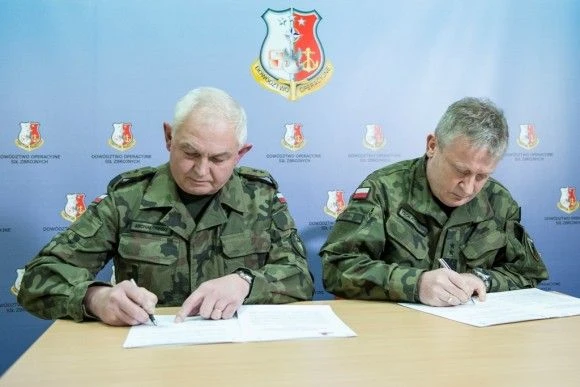Industry
Inmarsat Satellite Systems for National Security
Another SatCom Club meeting was organized at the United Kingdom Embassy in Warsaw.This time, the meeting focused on “Satellite technologies and services in support of the national security”.Within the framework of the event, technological solutions offered in that area by the Inmarsat company were presented. Role of the communications systems in the modernization process pertaining to the Polish Army was also thoroughly discussed.
SatCom Club Conference
Another SatCom club meeting was organized at the United Kingdom Embassy in Warsaw, on 6th April. This time, the meeting was focused on “Satellite technologies and services in support of the national security”.
Technological Development and Space Innovations – Following the Changes
The meeting began with a presentation by Andy Start, President of Global Government at Inmarsat. Start discussed the challenges that are being faced by the governments, within the scope of satellite communications in today’s unstable environment, with growing number of local and international conflicts, taking place at a number of remote locations. Moreover, the problematic character and significance of the satellite technologies are amplified by the presence the increased importance and value the Internet has in our social and political lives. This forces the governments to provide quick web access for their employees. Challenges like that, as Start suggested, emerge all around the world, also in case of the countries that are viewed as the richest ones. On the other hand though, the new needs are met thanks to development of the new technologies and innovations, making it possible to use the space technological advances in a better, more effective, cheaper and quicker way.
Three Technologies That Will Change The Space Industry
Andy Start, during his speech, referred to three of the most revolutionary technologies which have been applied by the space industry in the recent years. These included multiple-use launch vehicles (e.g. Falcon 9), high frequency satellites ensuring that large volume data transfers may be realized, with reduced size of the hardware, as well as electric spacecraft and satellites with reduced weight. All of those innovations together will make it possible to cut down the costs related to use of the outer space, also enabling the owners of the space technologies to increase the data flow realized with the use of the satellites.
Latest Inmarsat Technologies
Inmarrsat is also engaged in numerous research and development initiatives, the goal of which is to increase the offer’s level of innovation. The representative of the company, during his speech, referred to a 6.6 tonnes Alphasat (Inmarsat 4A F4) satellite which was sent into orbit back in July 2013. This platform delivers additional L-band data transfer capabilities for state and commercial users in Europe, Middle East and Africa. Global Xpress is the second of the discussed initiatives. Within the framework of this programme, three out of four planned satellites are already orbiting around the Earth. The systems transmits the Ka-band data globally, also for military purposes. Inmarsat is also working on new generation Inmarsat 6 suite, operating within L- and Ka-bands.
Global Xpres, which was a subject of a separate presentation, is a programme within the framework of which Inmarsat made an investment of 1.6 billion US dollars. The satellites of this constellation are going to create an Internet access system, delivered globally by a single observer. The system will be addressed towards private users (which was stressed during the meeting at the embassy), as well as other state services, such as Civil Service or the Police. Technical aspects of the system’s operation were also discussed, also the issues related to data security and jamming countermeasures.
Satellite Communication Systems and the Polish Army
Col. Bogusław Jaworski of the Polish General Staff presented the communications needs of the Polish Armed Forces. According to the Colonel’s speech, Poland focused on important of this type of communications during the foreign deployments to Iraq and Afghanistan. Since then, the capabilities within that scope have been systematically developed and expanded, within all of the armed forces. In the future, it is expected that the aforementioned systems would be further developed, both in the combat units, as well as within the framework of the support systems, including the BMS and UAV programmes.
Inmarsat for the Armed Forces
Inmarsat, on the other hand, has been able to indicate 11 out of 14 Polish Armed Forces modernization programmes, within which the company could offer its satellite communications systems, meeting, to a large extent, the potential requirements of the end users. These include aerospace and air defence systems, modernisation of the armoured and mechanized units, and the areas related to the individual equipment used by the soldiers, countering the naval threats, and, of course, satellite reconnaissance systems.
